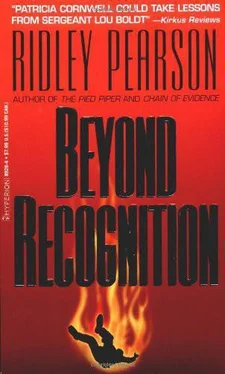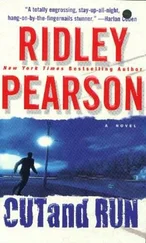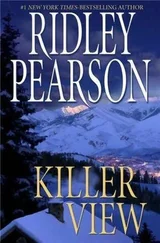Ridley Pearson - Beyond Recognition
Здесь есть возможность читать онлайн «Ridley Pearson - Beyond Recognition» весь текст электронной книги совершенно бесплатно (целиком полную версию без сокращений). В некоторых случаях можно слушать аудио, скачать через торрент в формате fb2 и присутствует краткое содержание. Жанр: Триллер, на английском языке. Описание произведения, (предисловие) а так же отзывы посетителей доступны на портале библиотеки ЛибКат.
- Название:Beyond Recognition
- Автор:
- Жанр:
- Год:неизвестен
- ISBN:нет данных
- Рейтинг книги:5 / 5. Голосов: 1
-
Избранное:Добавить в избранное
- Отзывы:
-
Ваша оценка:
- 100
- 1
- 2
- 3
- 4
- 5
Beyond Recognition: краткое содержание, описание и аннотация
Предлагаем к чтению аннотацию, описание, краткое содержание или предисловие (зависит от того, что написал сам автор книги «Beyond Recognition»). Если вы не нашли необходимую информацию о книге — напишите в комментариях, мы постараемся отыскать её.
Beyond Recognition — читать онлайн бесплатно полную книгу (весь текст) целиком
Ниже представлен текст книги, разбитый по страницам. Система сохранения места последней прочитанной страницы, позволяет с удобством читать онлайн бесплатно книгу «Beyond Recognition», без необходимости каждый раз заново искать на чём Вы остановились. Поставьте закладку, и сможете в любой момент перейти на страницу, на которой закончили чтение.
Интервал:
Закладка:
Boldt said, “I think the cabin is a good idea for you.”
“For all three of us, you mean.”
“Yes.”
“You’re scaring me.”
“Sorry.” He had all sorts of pat answers ready. Stuff like this happened to cops. They had been lucky all these years to have seen so little of it. He felt tempted to share with her the sight of Branslonovich exploding-for that was the only way to describe what had happened-not so much to frighten her but because he needed to tell someone, needed to vent some of the anger and fear that the violent death had instilled in him. He still saw her spinning around like a dancer-yellow, blue, then white. He still heard that cry.
“You there?” she asked.
“Yeah. Here.”
“You want to come over? Sleep with me? They gave me the guest room.”
His wife asking him to sleep with her, to hold her, to comfort her. He wanted nothing more. He said so.
“But you’re staying,” she said.
“I couldn’t sleep if I tried. I’ll go downtown, try to sort some of this out.” He wanted a look at the most recent poem sent to Garman.
“I’d rather just lose the house, you know. I wish-and I mean this! — I wish he’d gotten the house, that he’d taken the house and left us alone.”
Boldt was silent for a long time.
“I know that silence. You’re saying he doesn’t want the house, he wants you .” She gasped. “Oh, God.”
“I didn’t say anything.”
“He wants you. Is that it?”
“We don’t know what he wants. We don’t know who he is. We don’t know much.”
“Someone you put away before?”
“Doubtful.”
“I hate this. Jesus God. What do we do?” she cried into the phone.
“Can you get a leave?”
“I’m owed weeks .”
“Do you mind?”
“Being driven out of my own home? Of course I mind,” she snapped. He waited her out. “No, love, I don’t mind. No, of course not. But I wish you’d join us.”
“The Sheriff’s Department will watch the road. The cabin too, probably.”
“Oh, God. I can’t believe this is happening.”
“Could Susan go with you?”
“I can ask. She might. I love you,” she blurted out. “God, how I love you!”
“No music so sweet,” he whispered into the phone.
“Always and forever,” she added.
“We’ll get through this,” Boldt said, “and we’ll reevaluate and we’ll make sense of the last few months.”
“We need to talk,” she said, and to him it rang as something of a confession, and his heart wanted to tear from his chest.
“Yeah,” he agreed. If tears made noise, she would have heard them.
“You amaze me.” Her voice trailed off. “Have I told you lately how much you amaze me? What an incredible man you are?”
“A little overweight,” he said, and she laughed, barking into the phone.
“Not to me,” she said.
“I love you, Elizabeth.”
“Sleep if you can.”
They hung up.
Boldt ignored orders and took a long hot bath in the old clawfoot that had come with the place, running the faucet twice to reheat the water. When he got out, he pulled the drain plug. Ten minutes later, the tub was only half empty. He searched the house for a plunger but couldn’t find one. Not one damn plunger in the entire house!
The kitchen sink still filled with dishes hadn’t drained either, but Boldt didn’t notice it. He was already out the door and on his way downtown, off to prepare for that dreaded meeting with Shoswitz.
31
The death of a fellow police officer was like a death in the family. For the Seattle Police Department, death incurred while on duty happened so rarely that in his twenty-four years on the force, Boldt had only attended three such funerals. Staged as pageants more than funerals, they gripped the city’s collective consciousness. Flags were lowered, streets were closed, and, on a marbled hillside high above the rat race, weapons were aimed into the gray sky and fired in bone-chilling unison.
By sunrise the morning after the botched attempt to net the arsonist, all the crews had left both the park and Boldt’s home. Only a ribbon of yellow and black police tape remained at both sites. A single cruiser with two patrolmen cruised between the two crime scenes. Identification technicians were scheduled to return to both at first light.
Boldt beat them to it. Perhaps it was the look that Shoswitz had given him in the operations van just before the exercise began. Perhaps it was Branslonovich’s spectral dance among the towering trees. Perhaps it was his arrival at Branslonovich’s torching, only seconds too late. Whatever the reason, Boldt felt directly responsible for her death. The image of her twisting body, arms outstretched in a crucifix, remained seared into his consciousness, plaguing him. Eyes open or shut, it didn’t matter, the image remained. His to live with. Or try to.
Chief among his frustrations was that the only apparent witness, an ERT officer by the name of Robbie, had a jaw so badly broken he could not speak. His one scribbled message was that he had not gotten a clean look at the suspect.
Boldt’s fascination remained with the crime scene in the park. He ducked under the police tape, unseen. Overhead, the stark limbs of the deciduous trees captured the orange-ruby glow of a spectacular sunrise, bleeding a rosy daylight onto the forest floor. The conifers and cedars towered overhead majestically. Boldt walked among the fallen limbs and the wintering weeds and shrubs, avoiding the downtrodden path created hours earlier by a dozen anxious firemen and patrol officers responding to the scene. He cut his own path, the symbolism not lost on him. Although there would be a pulling together of SPD because of Branslonovich’s death, Boldt was certain to find himself isolated, cut free by Shoswitz, and the subject of several briefings and reviews. If he were determined “solely responsible” for “recklessness” in the hasty fielding of the operation, it was conceivable he would be suspended without pay or even asked to retire. More than anything else, those last few hours planted firmly into Boldt’s mind the reality of his advancing years of service. He was at that time the most senior homicide cop, considered old guard and, in a department looking to reinvent itself in the wake of national disgrace in other inner-city police departments, an endangered species.
The burned section of trees stuck out like a charred cancer. Boldt steered his way toward it, eyes alert in the shimmering light for any stray piece of evidence particular to a human presence. The arsonist had been in that area, and despite the trampling caused by the emergency crews, Boldt held to the possibility, the probability, that evidence had unintentionally been left behind, as was nearly always the case.
Circling the area several times, he found nothing of significance on the outskirts of the burn, but his imagination began to place the killer hiding there. He worked his way in toward the center, like growth rings on a cut stump. He chose two trees at the relative center of the burned area, a circle of roughly twelve feet of cleared ground blanketed in a white ash, only two tall trees remaining intact, their bark badly burned, rising a distance of ten to twenty feet. Searching the area, Boldt realized the brilliance of the deed: The arsonist had burned any and all evidence of his being there along with Branslonovich, a complete and thorough job. Another example, the detective thought, of the kind of fore-thinking mind responsible. He didn’t appreciate having a worthy adversary; he would have preferred an ignorant, emotional, mistake-ridden sociopath who inadvertently left evidence at every crime scene.
Keeping the arsonist’s intentions and motivations in mind-a point of view critical to an investigation-Boldt shifted left and right, side to side, in an attempt to provide himself with any kind of a view of his own home. But all he saw was Phinney Way, all he heard was the traffic on Greenwood. He glanced up.
Читать дальшеИнтервал:
Закладка:
Похожие книги на «Beyond Recognition»
Представляем Вашему вниманию похожие книги на «Beyond Recognition» списком для выбора. Мы отобрали схожую по названию и смыслу литературу в надежде предоставить читателям больше вариантов отыскать новые, интересные, ещё непрочитанные произведения.
Обсуждение, отзывы о книге «Beyond Recognition» и просто собственные мнения читателей. Оставьте ваши комментарии, напишите, что Вы думаете о произведении, его смысле или главных героях. Укажите что конкретно понравилось, а что нет, и почему Вы так считаете.












